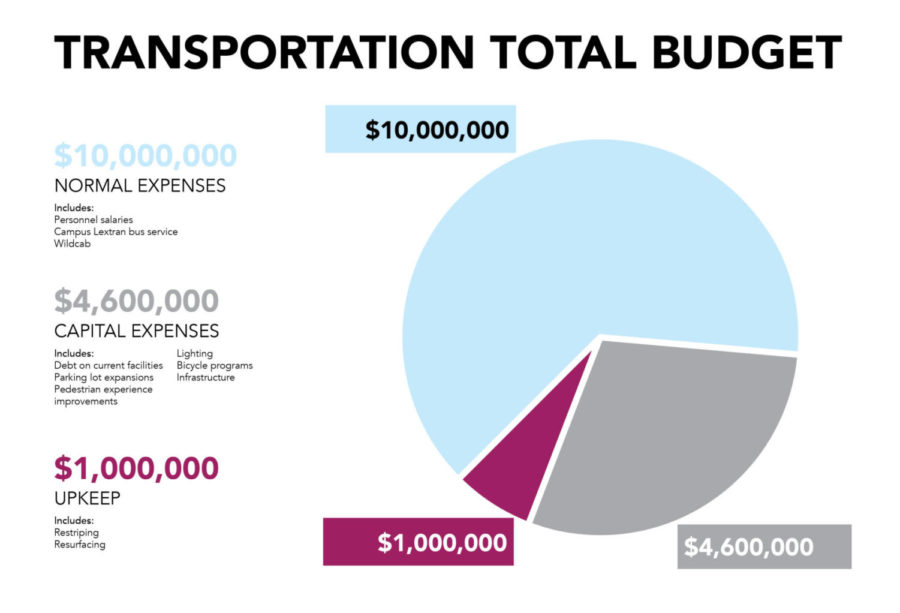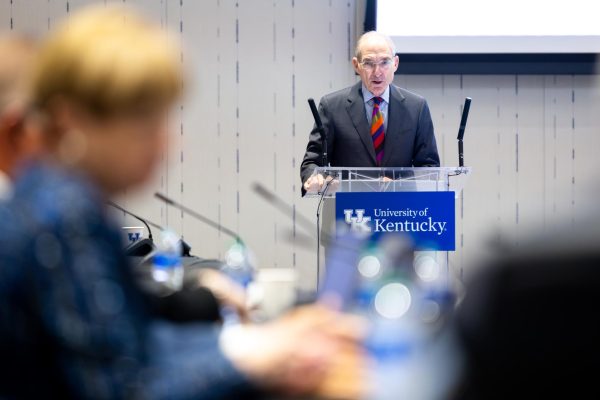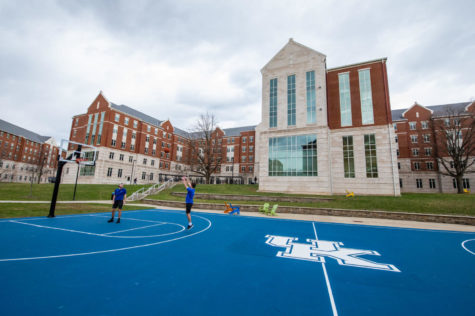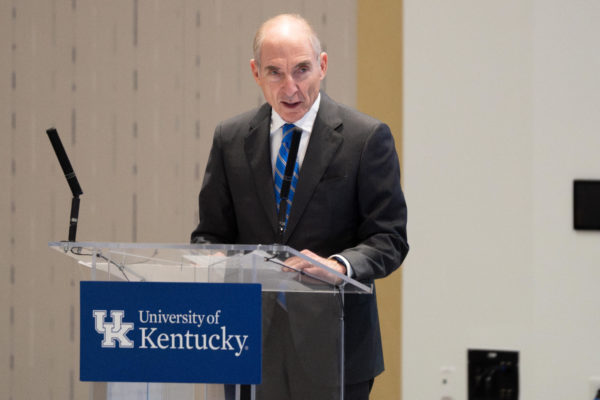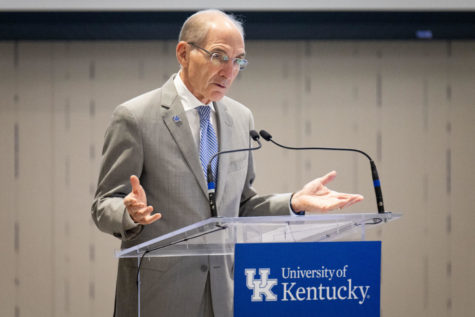‘Looking to the future’: How transportation services use your money for parking improvements
October 1, 2018
UK students pay close to $300 for regular, annual parking permits for on-campus lots. Where is this money going?
UK Transportation Services wants you to know.
According to a fiscal year budget that spans the past six years, UK’s Transportation Services, which is one of several auxiliary services at UK that generate independent income, generates most of its total income budget of $15 million from parking permit sales, which accounted for an average of about $7.5 million from 2013 to 2017.
According to 2017-2018 parking statistics for the department, close to 10,000 parking permits are sold to UK students and about 1,500 to BCTC students.
Its second highest income comes from visitor parking, which accounted for an average of $2.8 million during the same years. Other income comes from special passes, metered parking, reserved permits, validations, citations, towing, ride home expenses and a student fee.
“I think there’s this misnomer that we get so much of our revenue off of citations and towing, and that’s a small piece of what we bring in,” said Lance Broeking, director of Transportation Services.
Melody Flowers, executive director for strategic analysis and policy, said about 2,000 parking spaces have been added over the past four years. Projects this summer added 500 new spaces.
Transportation also received about $250,000 this fiscal year from student fees. These take the shape of $5 fees per student. According to Lisa Cleveland, marketing and communications director for Transportation Services, this fee was approved in 2017 by the Student Council, went before the UK Board of Trustees during the summer of 2017 and became effective at the start of the 2017-2018 fiscal year.
Broeking said a Student Transportation Fee Advisory Council helps directs the spending of this money, and the money goes to initiatives that interest students.
Flowers said this initiative is “student focused, student driven, student advised” and is a “small sliver” of the total budget.
Morgan Welden, a junior studying biology at UK who parks at Newton Crossing, said that she has never used the bus service at UK but thinks the $5 student fee is fair.
“I think the buses are good for people who use them,” she said. “You just show your student ID and you ride for practically free— not free, you pay for it in your tuition. I think that’s a good thing, but I do agree that the parking needs to be improved especially for students who live farther from K Lot and freshmen who don’t qualify for a commuter pass because of their hours.”
She said what she would like to see on campus are more lots on main campus.
“During freshmen year, I parked in K Lot and I lived on north campus, which is like a mile— over a mile— walk,” she said. “So I thought that was a little ridiculous. And the parking permits are still $300 to walk a mile to it. I wish we had more parking on north campus and better commuter lots for people who do live off campus.”
Broeking said transportation employees “try to manage spaces as efficiently as possible,” including avoiding empty spaces in one lot while another is overbooked.
He also said their contingency plans have been successful, such as directing cars to the Greg Page overflow lot. The first week of classes is usually the most hectic as transportation personnel work to manage overflow and direct traffic, but this year has gone smoother, he said.
Flowers said that Transportation Services attempt to have “very active management” through these representatives’ directing traffic in campus lots, but their goal is to get another garage built soon to lessen the need for such active management. UK Transportation Services is currently 10 years in to a 20-year debt on a Press Avenue structure.
“There’s a spot for everybody right now,” she said. “It just takes people helping and communicating and directing and we want to be able to build more capacities so that people are able to more easily navigate the system.”
The garage they want to build will rely on several variables, however. Broeking said they have never used debt to fund surface parking projects and only use debt to build large parking structures, and “any improvement projects you see, those are typically paid in each year’s cash flow.”
Each year since 2013, Transportation Services been able to roll over an average of $2.6 million into the next year’s budget, a surplus Flowers said will go towards this new parking structure.
“When you do that, you need to have sufficient funds that you’ve strategically built up over time so you can make that large investment,” she said.
She said new structure demand depends on student growth, and “our students have been growing, the hospital has been growing.” The cash flow that the department maintains, however, is not enough to begin the garage without a mediator issuing bonds.
Broeking said they have not lost space due to construction on campus, despite many sites taking up space in parking lots. He said the increased demand for parking is thanks to more on-campus students and other growth on campus. He said enrollment at the university continues to grow, and the department makes plans anticipating continued growth.
“We are always looking to the future,” he said.
To begin the new parking structure, UK Transportations services needs to obtain debt authority from the state legislature to build their next structure, which could be as much as a $25 million project.
Connor Dalstad, a junior studying management at UK, said he parked on campus during his two years living on campus, but now lives off campus and walks to his classes.
“I definitely wish there was more parking opportunity on campus or close to campus,” he said.
He said he thinks transportation options for off-campus students are lacking, and it’s easier for him to walk to his classes.
“Paying that much for a parking pass per semester is a little bit much for me personally,” he said, although he said he thinks it’s fair that the department charges what they do for future projects.
Meanwhile, Broeking said the department is also attempting to lower demand for parking with other programs such as Spin, a new bike app that allows people to rent a bike for $1; the bus service, which keeps several active routes on and around campus; and the bike voucher program, which allows eligible students to receive $400 in vouchers that can be applied to a new bike or cycling safety equipment on the condition that they do not purchase a vehicle permit for two years. As a result of these initiatives, he said, he hopes fewer people will need to drive to campus and congestion will decline.
Mary Lenhof, a senior psychology major at UK, said she thinks if the department can successfully build the new garage they want to, it will help the problem.
“I think any more parking they can get would help,” she said.
She said she had a pass when she lived on campus, but no longer has one because it’s not worth the price. She said she thinks more parking spaces are needed.
“I feel like a lot of people are late to class because they can’t find a spot or they have to pay,” she said.
Broeking said the department tries to maintain transparency as much as possible.
“We know that there are a couple of truths about parking and one of them is that people are very passionate about parking,” he said. “There’s very few if any other departments on this campus that touch everybody on a daily basis.”
Everyone has to move around campus every day, he said, so everyone cares about what Transportation Services is up to.
“What I’d like people to know is that we’re not against them,” he said, “We’re for them and we’re all here trying to pull the same weight trying to make their experience better.”
















































































































































